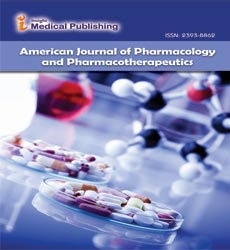ISSN : 2393-8862
American Journal of Pharmacology and Pharmacotherapeutics
Artificial Intelligence in Drug Safety Matters
Evelina Cardoso*
Depatment of Pharmacy, University of Lausanne, Lausanne, Switzerland
- *Corresponding Author:
- Evelina Cardoso
Depatment of Pharmacy,
University of Lausanne, Lausanne,
Switzerland,
E-mail: cardoso@gmail.com
Received date: November 18, 2023, Manuscript No. IPAPP-24-18485;Editor assigned date: November 21, 2023, PreQC No. IPAPP-24-18485 (PQ); Reviewed date: December 04, 2023, QC No. IPAPP-24-18485; Revised date: December 11, 2023, Manuscript No. IPAPP-24-18485 (R); Published date: December 18, 2023, DOI: 10.36648/2393-8862.10.4.166
Citation: Cardoso E (2023) Artificial Intelligence in Drug Safetym a tters. Am J Pharmacol Pharmacother Vol. 10 No. 4: 166.
Description
In the realm of pharmaceuticals and healthcare, ensuring drug safety is paramount. With the advent of Artificial Intelligence (AI), there has been a seismic shift in how drug safety measures are approached and implemented. AI applications have revolutionized the landscape, offering innovative solutions and transforming traditional methods. This article delves into the profound impact of AI in drug safety matters, exploring its capabilities, challenges, and future potential. One of the pivotal roles of AI in drug safety revolves around its ability to process and analyze vast amounts of data. AI algorithms excel in recognizing patterns and extracting meaningful insights from diverse sources, including clinical trials, patient records, scientific literature, and adverse event reports. This capability allows for comprehensive assessments of drug safety profiles, identifying potential risks, and predicting adverse reactions more efficiently than conventional methods.
Drug Safety
AI is driving the evolution of personalized medicine by analyzing diverse datasets, including genetic information, lifestyle factors, and medical history. This approach allows for tailoring drug safety measures to individuals, considering their unique genetic makeup and susceptibilities to adverse reactions. By integrating AI with pharmacogenomics, treatments can be optimized, minimizing risks and maximizing efficacy on an individual basis. By leveraging predictive analytics, AI enables the anticipation of potential safety issues before they manifest on a broader scale. Through the analysis of real-time data streams, AI systems can forecast safety concerns, drug interactions, or unforeseen side effects. This proactive approach empowers stakeholders to mitigate risks, optimize treatment protocols, and enhance patient safety. AI technologies streamline regulatory compliance by automating complex processes involved in drug safety monitoring. They facilitate the interpretation of regulatory guidelines, automate adverse event reporting, and aid in ensuring compliance with evolving safety standards. This expedites the assessment and approval of new drugs while maintaining stringent safety measures. AI technologies streamline regulatory compliance by automating complex processes involved in drug safety monitoring. They facilitate the interpretation of regulatory guidelines, automate adverse event reporting, and aid in ensuring compliance with evolving safety standards. This expedites the assessment and approval of new drugs while maintaining stringent safety measures.
Novel Therapeutics
AI-powered algorithms excel in analyzing vast databases to identify existing drugs that could be repurposed for new therapeutic uses. This approach expedites the drug development process by identifying compounds with known safety profiles for alternative treatments. Additionally, AI aids in the discovery of novel drug candidates by predicting molecular structures and assessing their potential safety and efficacy. AI systems continuously monitor and analyze real-time healthcare data, including electronic health records and wearable device information. This real-time surveillance allows for the swift identification of emerging safety concerns, facilitating rapid responses to adverse events. Healthcare providers and regulatory agencies can take immediate actions, such as issuing warnings, modifying treatment plans, or conducting targeted interventions.
Despite its transformative potential, AI in drug safety encounters challenges and ethical considerations. Issues like data privacy, bias in algorithms, interpretability of AI-generated insights, and the need for transparent decision-making processes pose significant hurdles. Moreover, the reliance on AI systems raises concerns regarding accountability and the human oversight required to validate algorithmic outputs. The future of AI in drug safety is promising, marked by ongoing advancements in technology and regulatory frameworks. Integrating AI with other cutting-edge technologies like pharmacogenomics and precision medicine holds immense potential for personalized drug safety assessments. Collaborative efforts among stakeholders, including researchers, healthcare providers, regulatory agencies, and technology developers, will be crucial in harnessing AI's full potential for ensuring drug safety. The integration of artificial intelligence in drug safety matters signifies a paradigm shift in the pharmaceutical industry. Its capacity for data analysis, early detection of adverse events, predictive analytics, and regulatory compliance streamlining are revolutionizing how drug safety is ensured.
Open Access Journals
- Aquaculture & Veterinary Science
- Chemistry & Chemical Sciences
- Clinical Sciences
- Engineering
- General Science
- Genetics & Molecular Biology
- Health Care & Nursing
- Immunology & Microbiology
- Materials Science
- Mathematics & Physics
- Medical Sciences
- Neurology & Psychiatry
- Oncology & Cancer Science
- Pharmaceutical Sciences
